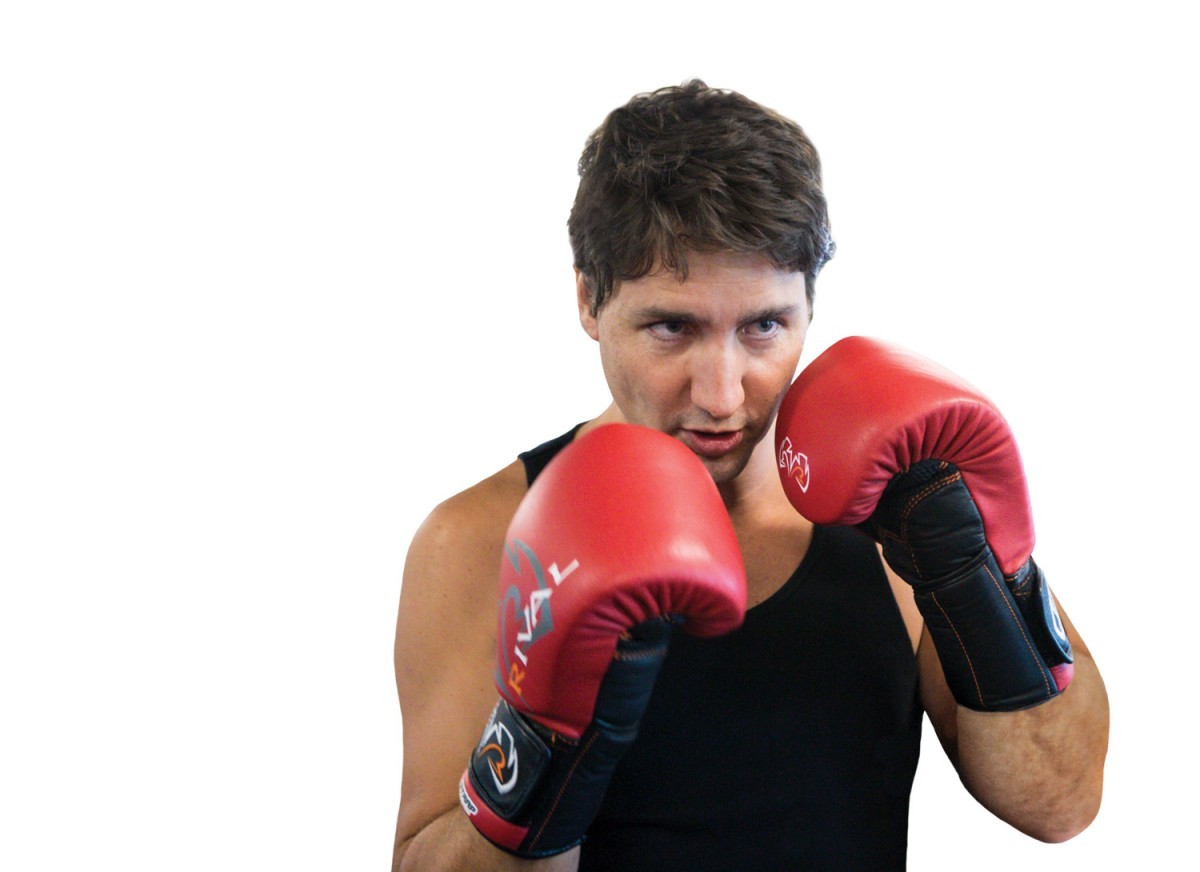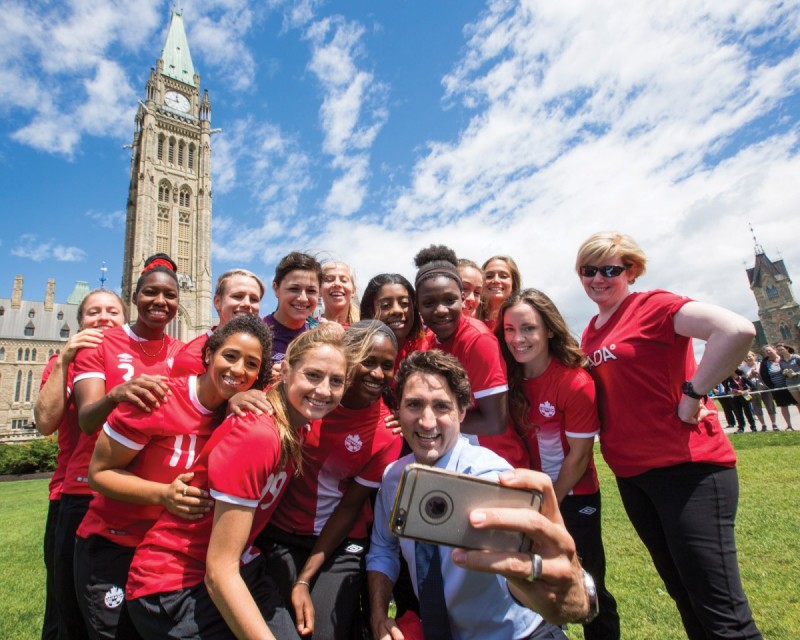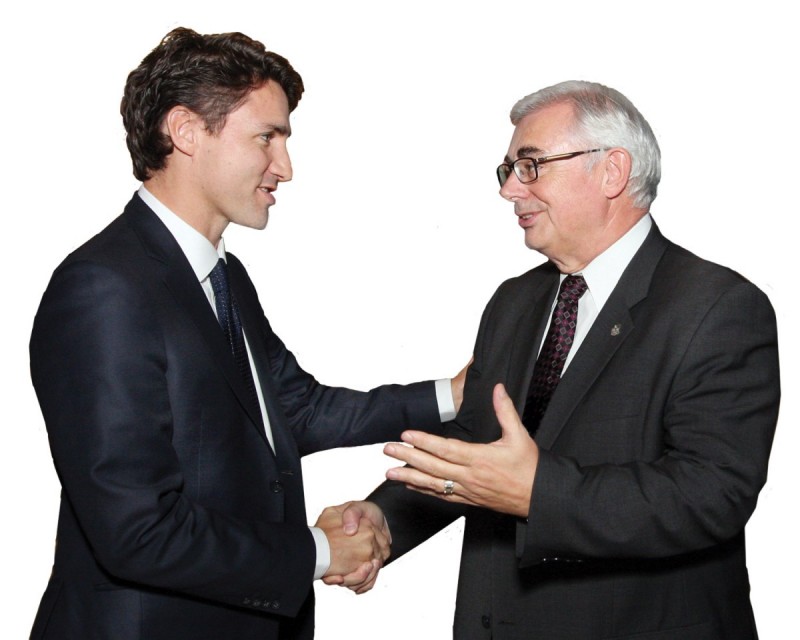
Prime Minister Justin Trudeau
Fall 2016
From his progressive views on Indigenous issues to his affirmative actions on women’s rights and his active engagement with the LGBTTQI* community—not to mention his shirtless photo bombs—it’s clear that Justin Trudeau is not your grandfather’s Prime Minister. He’s different. Free-spirited and expressive. Accessible and engaged. And ready to challenge the status quo.
University of Manitoba President David T. Barnard spoke with Prime Minister Trudeau recently on the value of upending expectations, participating in Pride and understanding the disruptive political situations in the U.K. and the U.S.
PRESIDENT DAVID BARNARD: When you came into office it was clear you were going to do things differently, not just politically, but personally. What motivated you, and to what extent is your desire to be different driven by the content of issues, and to what extent by the realization that sometimes we just need to disrupt things a bit to get people thinking differently?
PRIME MINISTER JUSTIN TRUDEAU: In any society there’s always a tension between defending the status quo—because you have a lot of stability and lots of success in society due to the status quo—and challenging that status quo: to improve, to do things better, to include people who have been excluded from success.
And I think it’s just the time right now where there is a need to rethink things; whether it’s around globalization or immigration or—much closer to home—around success in communities within particular groups.
I guess the point is, if you want to challenge a system to improve and disrupt it a bit, one of the best ways to do that is to give voice to those who haven’t been heard up until then. Make sure you’re folding everyone into a conversation that typically gets dominated by those who are already in power within a given structure.
I think that’s wise, and I think that’s perceptive and I think that’s very, very welcome. Do you think there might be an expectation that you will change more than ultimately you feel it makes sense to change?
Oh, I think that tension exists all the time. There are people who don’t want any change because the current system works out very well for them. And there are others who will want the system to be completely flipped upside down so that not only are the ones who have no power in power, but those who have positions of strength lose all that strength, and I don’t think you want to go that way either.
The trick is finding the balance in which we can continue to have forward movement and stability, while bringing in just enough disruption to make the right choices in terms of what we need to change and what we don’t want to change.
I think that’s a fascinating challenge and I really appreciate, as do many other Canadians, the way that you’ve faced it head on. This year the U of M participated in Pride Winnipeg and Pride Steinbach—where there had been a little uncertainty before the event occurred—and it was a meaningful experience for the university, and I found it meaningful personally to be involved. You’ve been very visibly involved participating in Pride events. What’s your response to that experience?
I think what Pride is really powerful for—on top of obviously addressing LGBT issues and having them recognized as not a source of shame but as a source of pride—it’s also a very nice way of engaging with the human rights conversation around our country. About how we respect individual rights and allow people to be who they are without fear of discrimination on the negative side, but also with a level of acceptance and confidence and pride in who they are.
So for me to see so many different individuals from different backgrounds and organizations and levels of government coming together to celebrate freedom and equality is absolutely great.
So I think Pride goes beyond just the LGBT community, which is always at the heart of it and faces continual challenges—as unfortunately we saw in the Steinbach case—but also an opportunity to reaffirm what freedom is in this country: the freedom to be who you are. For me, recognizing that there still are challenges is an important reminder of why we have to gather together and stand up for those rights.

Justin Trudeau, Canada’s engaged and accessible Prime Minister, takes a selfie with members of the women’s national soccer team, including Desiree Scott [BA/16], number 11, front row. // PHOTO BY ADAM SCOTTI
I think university students are in an interesting position of both trying to absorb, as you say, the knowledge and understanding of the world that exists, while understanding that they have a responsibility to challenge that world to improve and transform itself. And I think that creative tension makes for, in our successful universities, an extraordinarily fertile ground for improving and developing society in positive ways.
But always there are forces that resist and forces that push and how the community as a whole responds to those two opposing forces, and leads through them is important. A great example of that is your own personal, and the University of Manitoba’s, leadership around Indigenous issues. What you’ve done around truth and reconciliation, what you’ve shown with your own personal apology, taking on the challenges of the past and framing them in a way that leads to building a stronger future is exactly what one hopes universities will both model to their students and empower their students to do in their coming lives.

Prime Minister Trudeau and President Barnard. // PHOTO COURTESY OF UNIVERSITIES CANADA
Thank you for that. I appreciate it. There’s a lot of political tension in two of our long-standing friends—Britain and Brexit, and the flurry of activity to the south of us with the presidential election. Do you have any perspective that you’re comfortable expressing on those two issues?
I think we all know there are lots of different types of disruptiveness. And what I certainly deeply believe is that disruption can and must be a force for progress. Now, it’s easy to try to break things down and take advantage of worries and anxieties and lash out at them. It’s much harder to disrupt to progress, disrupt to build, disrupt to bring people together, to bring people who are outside the conversation into the conversation in a way that leads to a stronger society. And certainly my own approach has been very much focused on that, and I certainly expect and hope that ultimately the challenges of various disruptive discourses in other parts of the world will lead to positive shifting of political and social discourse in our country.
Well, I certainly agree with you on that. It seems to me that both the Brexit vote and the activity we see to the south of us suggest that it’s easy for people in leadership roles—as you have one and I have one—to become disconnected from the people that we think we’re serving and to find them pushing back in unexpected ways. Does that seem like a reasonable reading of the situation to you?
Very much. And that’s what I’m challenged with, and I know that anyone in a leadership position is challenged with, staying connected with those people we serve. And listening to them, understanding their fears and working on allaying them, understanding their hopes and dreams and working on fulfilling them, only happens if you are engaged and active in understanding and preoccupied with that.
I mean you can disrupt for a whole bunch of different motivations, but unless you’re disrupting in order to build something better that will have a deep and positive impact on people who have been left out or marginalized or disempowered, then perhaps the disruption is not as positive as it should be.
The temptation on disruption is to knock down the people at the top. I’d much rather boost the people not at the top and see whether the people at the top can handle it and adapt or get replaced. I think that’s a much more interesting approach and certainly one that I’ve tried to highlight in my political approach.
I want to thank you very much for being willing to do this and let you know that the University of Manitoba is actively engaged in conversations around the positive disruption of Canada.







Thanks for sharing this. I found it very informative and inspiring.
Great initiatives indeed